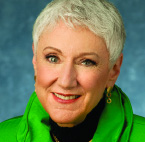Hadassah
President's Column
Shared Values
 Hadassah’s success has always been based on the vision, passion and dedication of our members, and on the funds we have raised from members and donors who believe in our mission. The more success we achieved, and the more confidence we inspired in our work, the more contributions we received.
Hadassah’s success has always been based on the vision, passion and dedication of our members, and on the funds we have raised from members and donors who believe in our mission. The more success we achieved, and the more confidence we inspired in our work, the more contributions we received.
We have been blessed throughout our existence with generous donors who believe in our work. But I want to highlight one contributor here who has given the most consistently over the years. I am speaking of the United States government.
In 1961, President John F. Kennedy created USAID (the United States Agency for International Development) with the aim of improving lives around the world; promoting stable, free societies; fostering good will; and creating trade partners for the United States. Under the agency’s Aid to Schools and Hospitals Abroad program, the Ha–dassah Medi-cal Organization has been a recipient of annual grants for more than 50 years.
“I am proud to say that the United States government has a special relationship with the Hadassah Medical Organization,” Daniel Shapiro, U.S. ambassador to Israel, said at Hadassah’s Centennial Convention in Jerusa-lem in 2012. “Hadassah Hospital is a regular stop, highly recommended by our embassy, for senior government visitors to Israel. [Over the years], USAID has provided over $54 million in support to Hadassah Medical Center.”
With the addition of a $750,000 grant this year to underwrite equipment for a new diagnostic breast center at Mount Scopus, the total is now more than $56 million. Other equipment purchased in recent years with help from USAID grants includes ultrasound machines, respirators and CT simulators. The grants have been especially helpful in equipping the Sarah Wetsman Davidson Hospital Tower.
ASHA recipients are mostly institutions in developing countries, a category from which Israel has graduated. But the Jewish state, and HMO in particular, still addresses many of the broader priorities of USAID’s mission. Among those priorities are protecting human rights, improving glo-bal health, furthering education, helping societies prevent and recover from conflicts and providing humanitarian assistance in the wake of manmade and natural disasters.
HMO is an ideal candidate for USAID and ASHA for its treatment of Palestinian patients during times of war and peace, for its training of medical personnel from around the developing world (including the Palestinian territories) and for its function as a bridge to peace in a volatile region. In addition, HMO sends relief teams and specialists to disaster areas from the Philippines to Sri Lanka, from Ethiopia to Haiti.
One more thing Ambassador Shapiro said at our Centennial Convention is that the Hadassah network reminds him of the map you often find in the back of an airline magazine, showing all the connections a particular airline has around the world. The Hadassah map, he said, “would be at least 700 lines to public health professionals extending to more than 95 countries, all trained by the Hadassah–Hebrew University School of Public Health.” He also cited examples of HMO’s medical outreach through emergency missions and long-term training.
HMO not only fulfills many of the priorities in the USAID mission, it is also a unique expression of the relationship between the two nations. As a medical organization founded, built and maintained by an organization of American Jewish women, all Americans can feel both admiration for and pride in what we do.
Of course, the work we do through HMO is not designed to attract grants but to meet needs we see as critical to our own mission of healing Israel and contributing to the health and stability of the region. But free societies hold many values in common, so it is no surprise that our medical center is a strong link in the American-Israeli partnership.
Among the values that Israel shares with the United States is that the most effective aid—or AID—goes not only to those in need, but also to those who help others.










 Facebook
Facebook Instagram
Instagram Twitter
Twitter
Leave a Reply